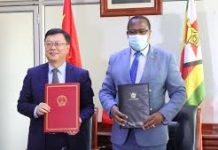BEIJING: As Beijing is still fighting intensively against the latest outbreak of COVID-19, the city government has decided to continue carrying out mass nucleic acid testing in districts and key areas and to implement stricter measures to contain the spread of the virus.
The city reported 117 new cases in the previous 48 hours by 3 pm on Sunday, bringing the total tally of infections to 727 during the latest COVID-19 outbreak since April 22, said Pang Xinghuo, deputy director of the Beijing Center for Disease Prevention and Control, at a news conference on Sunday.
Among the new infections, two were found during testing at the community level on Saturday, and others were reported in controlled zones, Pang said.
“The newly found cases at the community level are the biggest threat to epidemic control. The best option is to take faster action to curb the spread of the Omicron variant,” said Xu Hejian, a spokesman for the city government.
Xu also said that once a new case is identified, it is critical that related work such as epidemic investigations, identifications of close contacts and the transfers of patients to hospitals be handled within 24 hours of discovery.
Quick action is essential to curb the spread of the virus at the community level, he added.
Of the 727 newly confirmed infections involving 15 districts, Chaoyang has registered 299 cases, the most in the latest outbreak, followed by Fangshan, which has reported 195 cases.
Chaoyang has decided to conduct three rounds of mass nucleic acid testing for people living or working in the district from Saturday to Monday.
On Saturday, 15.52 million people in Beijing were sampled for nucleic acid testing. The screening saw five tubes test positive, with each tube containing 10 individual samples-two in Chaoyang and Shunyi, and one in Fangshan.
Since April 25, Beijing has conducted eight rounds of mass nucleic acid testing, and 60 tubes have tested positive, said Li Ang, deputy director of the Beijing Health Commission.
Yang Beibei, Chaoyang district’s deputy head, said at the news conference that the district has decided to carry out stricter epidemic control measures, requiring all people to work from home, whether they work in Chaoyang and live in other districts, or live in Chaoyang and work in other districts.
Operations at all enterprises have been suspended except for the ones that are needed to ensure people’s livelihood, she said.
According to Pang, 686 of the 727 cases since April 22 are people who have been vaccinated. Of the 686,588 had received at least two doses and none has been reported as a severely ill or critical case.
Pang urged eligible people, especially children and seniors, to get vaccinated as soon as possible.
As of Sunday, the city has 21 high-risk areas and 32 medium-risk areas for COVID-19, including a community in Tongzhou and another in Chaoyang that were designated as high-risk areas on that day. –The Daily Mail-China Daily news exchange item
[12:14 AM, 5/10/2022] DM Qadeer: China’s customs authority enhances medical checks for arrivals to prevent introduction of acute hepatitis in children
BEIJING: According to a statement sent to the Global Times on Monday, China’s General Administration of Customs has made arrangements to prevent the introduction and spread of acute, severe hepatitis of unknown origin in children which have been reported in multiple other countries and regions, the arrangements include enhancing health declarations, temperature monitoring and medical checks for arrivals from the affected countries and regions.
According to the World Health Organization (WHO), as of May 1, 20 countries have reported at least 228 acute severe hepatitis of unknown origin in children and 50 suspected cases. Among them, 14 countries in Europe have been affected, and cases have also been reported in the Americas, the Western Pacific and Southeast Asia. The cases taken into consideration mainly ranged between the ages of 1 and 16. In China cases of this acute hepatitis of unknown origin have not yet been detected.
The statement sent by the Chinese customs authority said that in response to the public health emergency, the administration has made full use of the global epidemic monitoring network, collecting daily information about the acute hepatitis at home and abroad and paying close attention to the epidemic development in the affected areas as well as to their response. These extensive measures can provide important data for subsequent risk assessment work.
The customs authority has requested all the customs in China to enhance health declarations, temperature monitoring and medical checks for arrivals from the affected countries. Passengers, especially children, with symptoms such as abdominal pain, diarrhea, vomiting and jaundice, who voluntarily report or are found at the scene, should undergo medical inspection in accordance with prescribed procedures. After medical checks, passengers suspected of suffering from the acute severe hepatitis of unknown origin should be transferred to designated medical institutions for further diagnosis and treatment.
According to the situation of global epidemic monitoring, the customs authority has prepared experts in infectious diseases, surveillance and early warning, pathogen biologists from Chinese CDC and customs specialists to launch a targeted risk assessment of an epidemic spread in the country, and to provide scientific basis for prevention and control measures in customs ports.
The customs authority has also strengthened communication with local foreign affairs, commerce, health, civil aviation, tourism and education departments, enhancing multi-departmental joint prevention and control in order to prevent the spread of the epidemic.
Symptoms of acute severe hepatitis of unknown origin in children include jaundice and gastrointestinal symptoms such as vomiting, diarrhea, and abdominal pain, according to the statement by the customs authority. During the entry and exit process, the authority urged travelers, especially those with children who have gastrointestinal symptoms and jaundice to report to customs for prompt medical treatment. The WHO recommended that hand washing can help reduce the spread of many common infections, said the statement.
–The Daily Mail-Global times news exchange item






